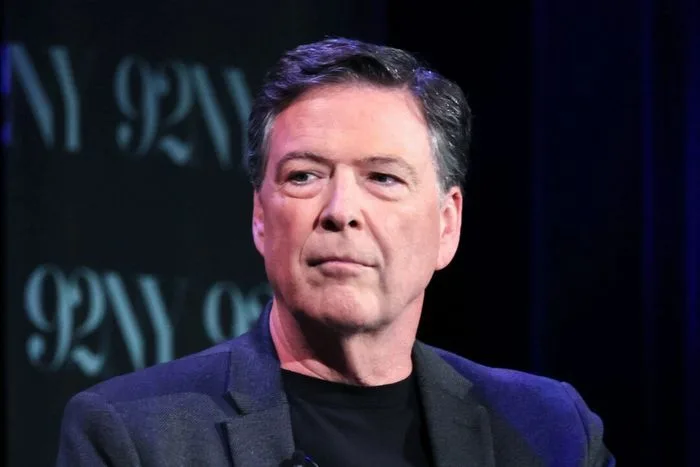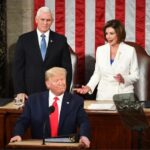By Joseph Lord, Lawrence Wilson and Ryan Morgan
ALEXANDRIA, Va.—Former FBI Director James Comey pleaded not guilty in federal court on Oct. 8 to charges of making a false statement and obstructing a congressional proceeding.
Comey, 64, dressed in a dark suit and red tie, sat quietly at the defense table throughout the proceeding. His attorney, Patrick Fitzgerald, requested a jury trial.
The tentative trial date is Jan. 5.
The federal government was represented by Jessica Halligan, who brought the indictment, accompanied by Gabriel Diaz and Nathaniel Lemon.
On arrival, Comey bypassed the public entrance to the Albert V. Bryan U.S. Courthouse, where a handful of protestors carried signs denouncing the charges as a weaponization of government.
Comey appeared before Judge Michael Nachmanoff, a former public defender, who was appointed by President Joe Biden in 2021. Nachmanoff was randomly assigned to the case.
Before releasing Comey on personal recognizance, Nachmanoff instructed attorneys for both sides to agree on a discovery schedule by Oct. 10, or else submit their proposed schedules by Oct. 13.
The judge instructed the Department of Justice to provide security clearances as necessary if any evidence in the trial is classified.
Initially, Comey was set to be arraigned Oct. 9, but the hearing in Alexandria, Va., was moved to Wednesday morning. Both charges stem from Comey’s Sept. 30, 2020, testimony to the Senate Judiciary Committee.
Comey was indicted in U.S. District Court for the Eastern District of Virginia on Sept. 25. Grand jurors rejected one of the counts brought against him. The two charges that were approved carry a maximum sentence of five years in federal prison if he is convicted.
The first charge, a violation of 18 U.S. Code § 1001, involves making false statements to government officials. The statute penalizes anyone who “makes any materially false, fictitious, or fraudulent statement or representation” in matters under the jurisdiction of the federal government. In this case, the charge relates to the legislative branch.
The second charge allows for fines or up to five years in prison for knowingly misrepresenting, withholding, or preventing the disclosure of information during a congressional proceeding.
The indictment filed by the Justice Department cites Comey’s claim to the panel that he “had not ‘authorized someone else at the FBI to be an anonymous source in news reports’ regarding an FBI investigation concerning” an unnamed “PERSON 1.”
Several individuals mentioned in the document are similarly named and numbered.
The document alleges, “That statement was false, because, as [Comey] then and there knew, he in fact had authorized PERSON 3 to serve as an anonymous source in news reports regarding an FBI investigation concerning PERSON 1.”
It also alleges that Comey “corruptly [endeavored] to influence, obstruct and impede the due and proper exercise of the power of inquiry under which an investigation was being had before the Senate Judiciary Committee by making false and misleading statements before that committee.”
One count brought against Comey by the government was rejected by grand jurors in September.
According to court documents, prosecutors attempted to bring an additional charge under 18 U.S. Code § 1001.
That count alleged that Comey “falsely [stated] to a U.S. Senator during a Senate Judiciary Committee hearing that he … did not remember ‘being taught’ of PERSON I’s ‘approval of a plan concerning’ PERSON 2 and the 2016 U.S. Presidential election.”
Under federal court rules, a charge is rejected if 12 or more members of the 16-member grand jury don’t believe there’s enough evidence to move forward on the case.
In a statement announcing the indictment, Lindsey Halligan, U.S. attorney for the district of Eastern Virginia, said the charges “represent a breach of the public trust at an extraordinary level.”
“The balance of power … relies upon accountability and a forthright presentation of facts from executive leadership to congressional oversight,” Halligan said. “Any intent to avoid, evade, prevent, or obstruct compliance is a violation of professional responsibility and, most importantly, the law.”
Attorney General Pam Bondi said in a Sept. 25 statement, “No one is above the law. Today’s indictment reflects this Department of Justice’s commitment to holding those who abuse positions of power accountable for misleading the American people. We will follow the facts in this case.”
In a video posted to Instagram on Sept. 26, Comey responded to the indictment, claiming his innocence and suggesting that he was prepared to address the allegations in court. Comey told viewers that he is “not afraid.”
“My heart is broken for the Department of Justice, but I have great confidence in the federal judicial system, and I’m innocent,” Comey said. “So let’s have a trial.”





